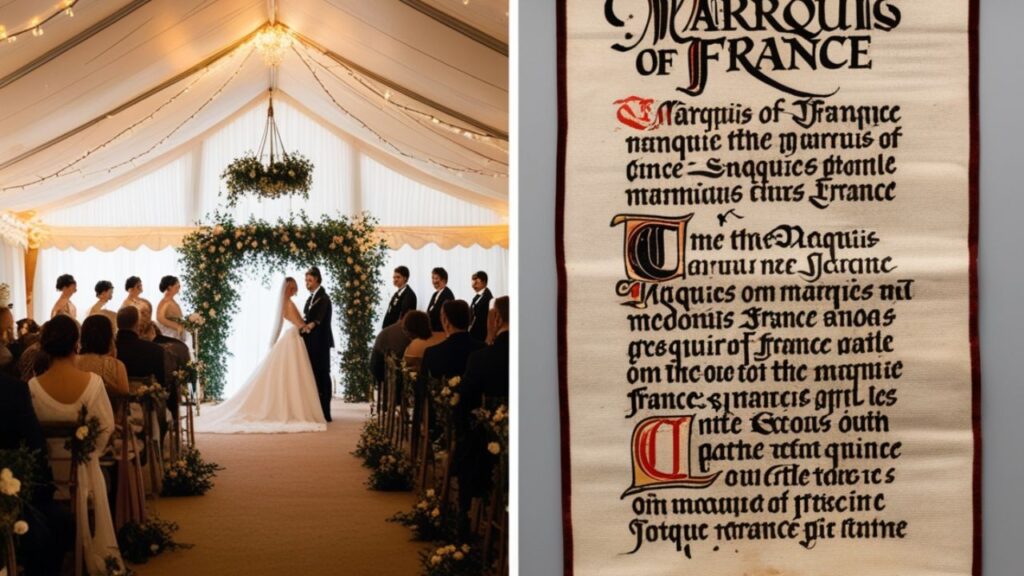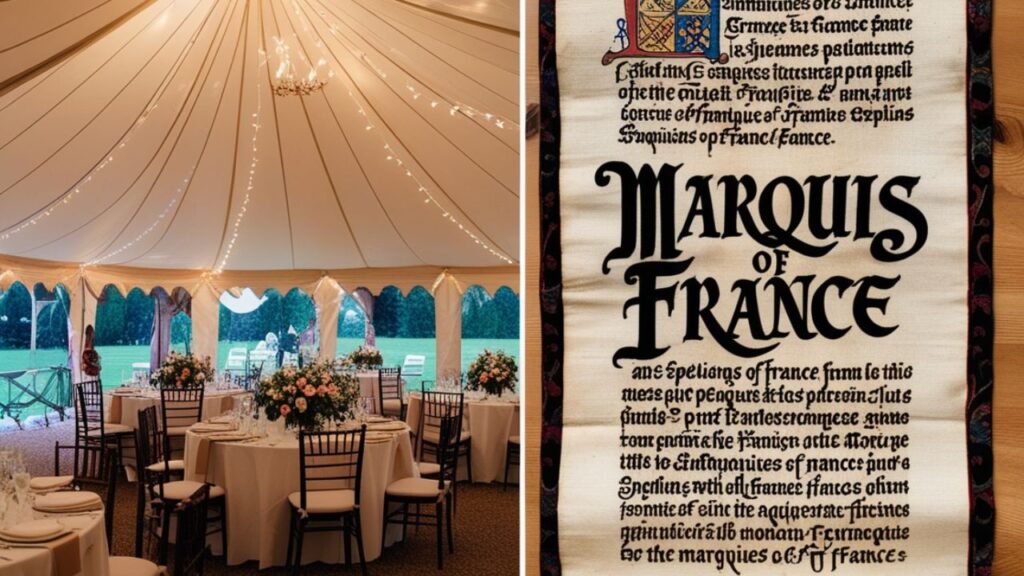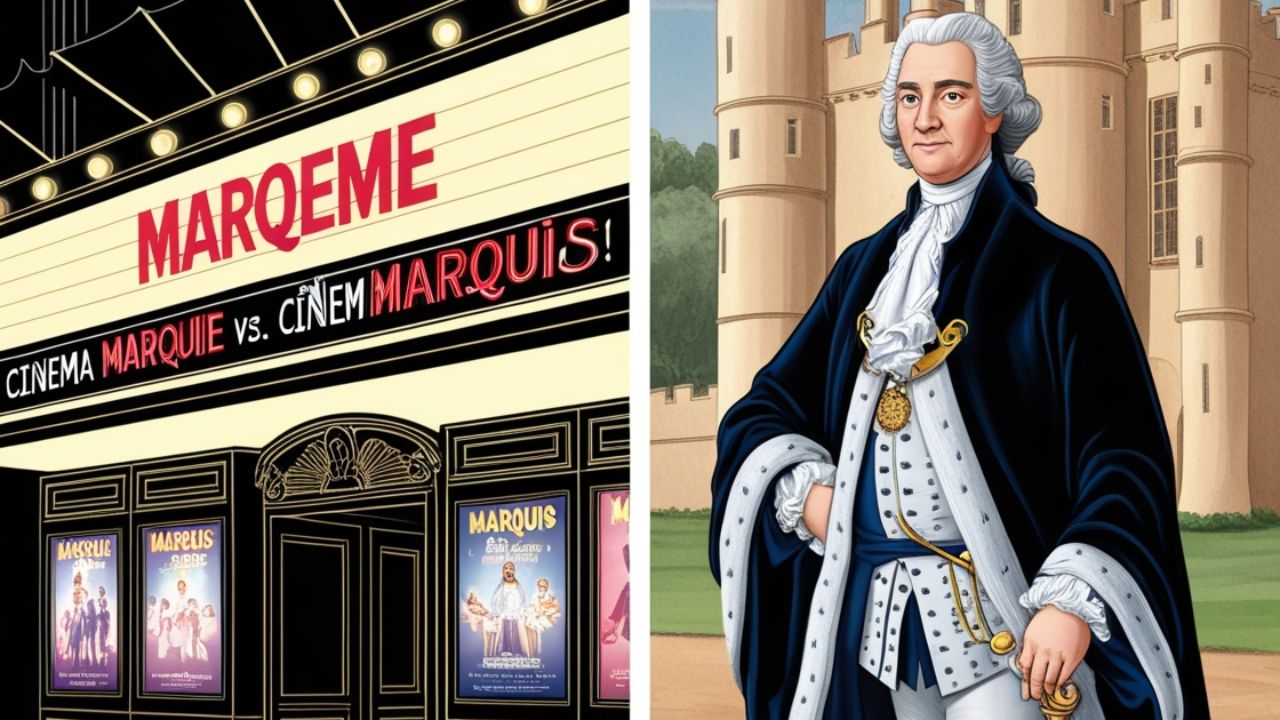Marquee is a word often used for a big tent at weddings or a bright sign outside a cinema. In some places, people also use it to mean a headline celebrity. It always points to something visible, grand, or attention-catching.
Marquis is a title given to nobles in old European history. It ranked high, just below dukes but above counts or earls. This word connects with castles, leadership, and traditions from centuries ago, carrying strong links to heritage and prestige.
The difference is clear when you look at meaning and usage. One highlights entertainment, signs, and events, while the other describes aristocracy, nobility, and titles. Learning them correctly helps writers, students, and readers choose the right word every time.
What Is a Marquee? Meaning and Common Uses
A marquee is often seen at special gatherings like weddings, fairs, or school functions. It is a large tent that gives people shade or shelter. In other places, the same word also means a bright theater sign with glowing letters.
In British English, this word is mostly linked with outdoor events, while in North American English, it is connected to cinema or concert signs. Both uses show importance, celebration, and attention, making it easy to remember in different settings.
Definition of Marquee
The word marquee describes something large and important. It can be a tall sign placed outside theaters showing film titles, or a wide tent used during big events. Both uses point to something noticeable and central in daily life.
In different countries, the word may carry separate meanings. In Britain, it often refers to a tent for celebrations, while in America, it highlights a glowing sign at cinemas. Either way, marquee always suggests prominence and strong attention.
Usage of Marquee in North American English
In North America, a marquee usually means a bright sign outside a theater or concert hall. The glowing board shows names of films, plays, or singers. It helps people notice events quickly when they walk along the street.
This word is often linked with entertainment and promotion. A shining marquee above an entrance builds excitement before the show even begins. It guides visitors, advertises programs, and becomes an important symbol of movie houses and musical venues across the country.
Usage of Marquee in British English and Events
In Britain, a marquee usually means a big tent set up for weddings, fairs, or school programs. Families and friends gather under it to celebrate, eat, and enjoy music. The tent creates shade, shelter, and a welcoming place for guests.
Across many towns and villages, the word marquee connects with outdoor occasions. People often hire these tents for birthdays, community gatherings, and summer festivals. They make events feel grand, organized, and comfortable, no matter the weather or the size of the crowd.
See also : Chillin Meaning, Usage & Pop Culture Explained
Real-World Examples of Marquee Usage
| Region | Context | Example Sentence |
| North America | Theater sign | “The theater’s marquee flashed the film’s premiere date.” |
| United Kingdom | Event tent | “The summer festival set up a giant marquee in the park.” |
What Is a Marquis? Meaning and Historical Background
Definition of Marquis
A marquis is a noble rank from European history. It stood below a duke but above an earl or count. This title showed respect, wealth, and power, often linked with large estates, castles, and duties to protect important lands.
The word marquis comes from old French traditions and was used for lords who ruled border areas. They carried authority, gave orders, and supported the king. Over time, the title became a symbol of status and strong family heritage.
Historical Context of Marquis
In old Europe, a marquis was given the duty of guarding lands near borders. These places were important because they protected the kingdom from outside attacks. The role carried both military strength and strong responsibility toward the ruler of the land.
During the Middle Ages and Renaissance, the title marquis showed honor and leadership. Families holding this rank often gained respect in royal courts. They managed estates, supported the crown, and became part of the history that shaped European culture and society.
Marquis vs. Marquess: Regional Variations
In Britain, the word marquess is often used instead of marquis. Both mean the same noble rank, but spelling and sound change with the region. This difference shows how language grows in separate ways across countries and cultures.
In France and America, marquis is the more common form. In Britain, people usually prefer marquess, pronounced with a softer ending. Even with spelling changes, the meaning stays the same, always pointing to a high place in aristocracy.
- In France and America, the word marquis is most common and pronounced “mar-kee.”
- In Britain, the word marquess is preferred and often pronounced “mar-kwis.”
- Both terms describe the same noble rank, only spelling and sound differ by region.
Examples of Marquis in Sentences
| Region | Context | Example Sentence |
| Europe (France, UK) | Noble title | “The marquis attended the royal court.” |
| United Kingdom | Historical title | “The marquess managed several estates in the countryside.” |
How to Avoid Confusing Marquee and Marquis

The two words, marquee and marquis, often puzzle people because of their similar pronunciation. Here’s how to keep them straight:
See also : Gussied Up Meaning: Origins, History & Modern Usage
Key Spelling Differences
- Marquee ends with “-ee” and usually relates to tents, theater signs, or entertainment events.
- Marquis ends with “-is” and refers to a noble title in European history.
- Marquess ends with “-ess” and is the British spelling for the same noble rank.
Pronunciation Nuances
- Marquee is pronounced “mar-kee” in both British and American English.
- Marquis is pronounced “mar-kee” in American English, similar to marquee.
- Marquess is pronounced “mar-kwis” in British English, showing a clear sound change.
Context Clues
If you’re reading or writing about entertainment, events, or signage, marquee is the right word. For discussions about aristocracy, history, or noble titles, use marquis or marquess.
Examples Table: Marquee vs. Marquis in Sentences
| Word | Context | Example Sentence | Region |
| Marquee | Theater sign | “The movie title was displayed on the marquee.” | North America |
| Marquee | Event tent | “They set up a marquee for the wedding party.” | United Kingdom |
| Marquis | Noble title | “The Marquis of Queensberry established boxing rules.” | Europe |
| Marquess | Noble title (UK) | “The Marquess owns several estates.” | United Kingdom |
Summary: Mastering the Difference Between Marquee and Marquis
The words marquee and marquis sound alike but show very different ideas. One is linked with theaters, tents, and entertainment, while the other belongs to history and nobility. Clear use makes writing stronger and avoids mistakes in everyday communication.
Learning the meaning of marquee in modern life and marquis in old European titles helps readers and writers stay correct. Remembering spelling, context, and region will make language easier, clear, and more confident when used in stories, lessons, or formal writing.
- Marquee refers to event tents, theater signs, or sometimes a headline celebrity.
- Marquis or marquess is a noble title from European history, below a duke but above an earl.
- Context, spelling, and region decide the correct choice every time.
Practical Tips for Writers

- Think about context: events and entertainment use marquee, history and nobility use marquis or marquess.
- Check spelling endings “-ee,” “-is,” and “-ess” to avoid mistakes.
- Read sentences aloud; correct meaning usually becomes clear from the topic.
Final Thoughts
Understanding the words marquee and marquis makes language clearer and richer. One belongs to modern events and signs, while the other connects with noble traditions. Both words add beauty and depth when used with care in stories, lessons, or speech.
Strong writing depends on choosing the right word for the right place. By learning how marquee and marquis differ, readers and students can build confidence. This knowledge supports better communication and helps ideas shine in schoolwork, books, and conversations.
FAQs
Is it marquis or marquis?
The correct spelling is marquis. It refers to a noble rank in some European countries, pronounced “mar-kwis.”
What is the difference between a marquee and a marquess?
A marquess is a noble title, while a marquee is a large tent or prominent sign. They are entirely different in meaning and usage.
What is the feminine of marquis?
The feminine form of marquis is marquise, used for a woman holding the equivalent noble rank.
What does marquis mean?
Marquis is a noble title ranking above earl or count but below a duke, traditionally used in European aristocracy.

Join Bibcia on a journey to master English grammar. Discover easy lessons, writing tips, and practical examples designed to make learning grammar simple and effective.










